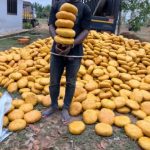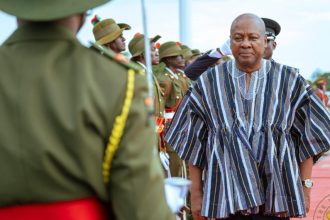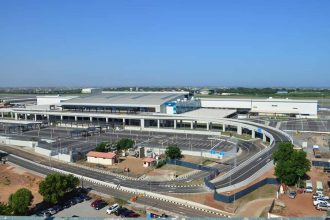Ghana’s relative peace has received global recognition and rankings. The 2022 Global Peace Index Report ranked Ghana as the most peaceful country in West Africa and 40th globally.
This was an improvement over the 2019, 2020 and 2021 rankings.
In 2023, however, Ghana dropped to 51st in the world and 4th in Africa; several factors accounted for the fall in the 2023 peace rankings.
Key among them was growing toxic narratives that fuel information disorder and polarisation mainly along partisan, ethnic, religious and chieftaincy lines.
Internal threats to peace and security in Ghana
Ghana’s peace architecture is gradually coming under stress. The threats are internal and external, and interwoven.
The internal threats include bubbling communal conflicts largely related to access to land, ethnicity and chieftaincy. The National Peace Council estimates over 400 chieftaincy conflicts in Ghana.
Again, youth bulge and youth unemployment are reserved arms. Youth unemployment was projected at 18.2% by the third quarter of 2023, according to the Annual Household Income and Expenditure Survey by the Ghana Statistical Service. The average national unemployment rate for the first three quarters of 2023 was 14.7%. The consequence of this is that disaffected youth without education, job, vocation or prospect of a meaningful future are vulnerable and potential targets for any group of persons to exploit. Such exploitation could be intensified by the unresolved structural issues in society or pulled by the psychological conditions of the youth or both. The youth also serve as fodder for recruitment to foment troubles. For example, they have become instruments of violence in the hands of some politicians, particularly, during elections.
Additionally, many citizens are becoming discontent with democracy. Some of the notable misgovernance are widespread corruption, trust deficit and hope deficit in state institutions, impunity, and suppression of the civic space by political authorities, human rights violations, and unfulfilled electoral promises, among others. The vexations are encouraging citizens to seek alternative and radical ideologies to express themselves.
Again, sporadic electoral violence and growing political thuggery which is proscribed by the Vigilantism and Related Offences Act, 2019 (Act 999) is gaining momentum, partly due to weak enforcement of the Act. While we explore the means to reduce the threat of insecurity, the National Commission of Small Arms and Light Weapons (NCSALW) was established. The Commission has the mandate to prevent, combat and eradicate the illicit trade in small arms and light weapons. Unfortunately, this major reason is faced with a challenge.
The NCSALW says there are about 2.3 million small arms in circulation in Ghana, of which 1.1 million are illegally possessed by civilians. Of the 1.2 million registered weapons, only a little over 3% of licences are renewed annually. In its bid to regularise illicit weapons in Ghana, the NCSALW carried out an Amnesty programme in 2020 which led to the retrieval of over 5000 firearms.
In that same year, the NCSALW and the Ghana Police Service destroyed 1,194 confiscated illicit small arms collected from the police armouries and exhibit stores in the Western and Western North Regions alone. These weapons were mostly seized from crime scenes. It does seem that the NCSALW is racing against time to regulate arms in Ghana. The Commission still operates with 1962 and 1972 laws in the fight against the acquisition of small arms.
Frank Boateng Asumani, the Head of the National Arms Marking Programme reiterated the Commission’s commitment to mitigating the proliferation of arms in Ghana.
“Out of 2.3 million small and light weapons in circulation, 1.2 million are legally registered and the remaining 1.1 million cannot be accounted for.
“The Commission is currently looking for funds to know the level of proliferation we have. We are talking about AK47s, pistols, pump-action guns, and locally manufactured guns.”
The internal stress on peace and security in Ghana is aggravated by farmer-herder conflict, largely as a result of climate change. The change in climate is mainly attributed to land scarcity, occupation and dispossession of farmland, absence of codification to the ownership of customary land, insecurity of tenure, desertification, drought, and other environmental conditions.
Farmer-herder conflict is also cooperative with the growing “gun culture.” The herders also face human rights violations such as marginalisation and negative labelling often meted out to them by fellow citizens and security agencies.
Such negative markings and stereotypes are cracked further through biased and inaccurate media reports.
External threats to peace and security in Ghana
As though the internal threats are not enough to undermine the security profile of the country, they are intensified by external factors. The external threats to Ghana’s peace primarily emanate from the spillover from violent extremist organisations in the Sahel Region. Most of Ghana’s neighbouring countries are theatres of extremist violence.
Notably, Burkina Faso, Nigeria, Cote d’Ivoire, Mali and Niger. And regular interactions and proximity between Ghana and these countries provoke predictions of fear and panic that Ghana may not continue to prevent violent extremism in perpetuity.
High-profile attacks by groups such as Ansaru and Boko Haram in Nigeria; Al-Qaida in the Islamic Maghreb (AQIM); Movement for Unity and Jihad in West Africa (MUJAO); Islamic State of West Africa Province (ISWAP); Jamaat Nasr al Islaam wal Muslimeen (JNIM) and Islamic State of Iraq and Syria (ISIS) in the Sahelian countries are too close for comfort.
These threats send shivers down the spine of Ghanaians. Violent extremism is a moment of danger against democracy. The external threats are impaired by recent democratic turbulence in West Africa which has resulted in six coups in Burkina Faso, Mali, Guinea and Niger.
The threat of information disorder
The internal and external threats to peace and security in Ghana are deepened by information disorder, polarising narratives and state threats fueled by social media.
The digitisation of human lives has brought about benefits, challenges and trade-offs. One of the obstructions to gaining a strong foothold is the unreasonable deployment of social media to spread information disorder.
Information disorder poses a threat to community resilience and peaceful co-existence. Social media is amplifying the operations and strategies of violent organised groups that deploy compelling messages mixed with ideological, political, religious and social narratives based on real and perceived grievances to advance their course. These include fueling crime and online violence. In recent times, the rightful occupancy of the Bawku Skin between the Kusasis and the Mamprusis, for example, has been intensified by the weaponisation of social media.
Decentralised broadcasting platforms; notably, Facebook, WhatsApp, TikTok and YouTube have aided cyber battalions and followers to create and share content to incite online and offline violence. This further stokes acrimony and conflict between the two claimants.
What is extremism and violent extremism?
One must avoid the linguistic error of defining extremism as violent extremism. “Extremism” is the belief and support for political or religious ideas that are very far from what most people consider as correct or reasonable.
It is usually a cognitive, attitude or behaviour that is deemed outside the norm. An extremist could become radical (extreme) in his or her political ideology or religious belief.
Extremism becomes violent, that is, “violent extremism,” when one translates those attitudes and behaviours into a violent act. This person chooses violence to impose his or her ideology on the society. The person becomes radical, alienated and adheres to violence. Violence moves from instrumental to symbolic for collective and homogenous gain. Violence also occurs as a result of a failure of early warning and early response mechanisms.
Is Ghana a safe haven for violent extremism?
Two arguments are emerging; whether Ghana is a “warehouse” for violent extremists or not. The first argument is denial. This position argues that violent extremism does not exist in Ghana.
The second is the reality argument. The realist argues that there are movements of violent extremists in the corridors of Ghana. The realist’s argument also holds two views. The first assessment is that the relative peace in Ghana serves as fodder and a safe haven for the violent extremists. The peaceful environment provides solace for the violent extremists to strategise. Therefore, they will not like to disturb the peace they are enjoying in the communities. The second opinion is that the mere presence or movement of the violent extremists in Ghana, particularly, along the border communities presents a significant security burden to the country.
Ghana has not witnessed violent extremist attacks yet, although it faces the risk of attack from within and outside. The reality is that there is a movement of violent extremists from the neighbouring countries into some of the border communities of Ghana. A 2023 survey by the International Organisation for Migration (IOM) in six communities in the northern part of Ghana established citizens’ perceptions of the presence of violent extremists in their communities.
The communities and the corresponding perceptions were rated as follows: Paga (96.5%), Kulungugu (98.2%), Namoo (95.1%), Mognori (95.3%), Pulmakom (99.5%) and Pusiga (99.5%). The findings are corroborated by the 2020 report of the Institute for Security Studies, titled “Breaking Terrorism Supply Chains in West Africa.” The report identified Namoo, Namori, Kulungugu, and Hamile as frequent locations where the police arrest smugglers and intercept firearms. It is argued that the threat of violent extremism may not necessarily come from outside.
The internal push and pull factors may serve as wallets for violent extremists’ behaviours. In countries where violent extremist attacks have occurred, the attacks were struck by local individuals and mutated into violent crimes and hyperlocal conflicts, for example, Nigeria.
What should citizens look out for?
Violent extremism is a faceless enterprise. It is often difficult to suspect and identify an individual as a violent extremist unless the person has gone through all the phases, namely radicalism, alienation, and adherence to violence.
In 2017, the then Minister of Information, Kojo Oppong Nkrumah, reported the threat of Ghanaian foreign terrorist fighters in the Sahel Region who were yet to return home.
Again, unbridled and irresponsible illegal gold mining in Ghana is another potential avenue that could be exploited by violent extremists to permeate into the security architecture of Ghana.
Illegal mining is one of the proceeds of financing terrorism and violent extremism. The ongoing irresponsible illegal mining dotted in several Regions of Ghana is of great security concern.
For example, illegal gold mining in communities in the Northern Region such as Naaga, Gbani, and the forest belt between Wuru in the Sissala East District and across the border in Kunu in Burkina Faso and Dollar Power is a worry to the interested public.
According to the Institute for Security Studies, Ghana is part of the transit zones of extremist funding and logistics, particularly, fertilizer smuggling, and cattle rustling (stolen livestock).
There are fears that disruption in the supply chain could lead to attacks as violence could be used to protect hideouts, secure supply routes, or attack border posts. Again, transborder smuggling of illegal arms, drug trafficking, human trafficking, and trans-organised crime pose a threat to the peace of Ghana.
Additionally, the presence of too many unapproved entry routes into Ghana, and ill-equipped entry points are leverage for extremists’ movements. Again, Ghana shares similar socio-economic conditions— poverty, illiteracy, youth unemployment, ethnic conflicts, and chieftaincy conflicts that drive violent extremism in the Sahel region. It is therefore worrying if governments decide to ignore these red flags but want to deal with violent extremism alone.
National and multilateral responses to dealing with violent extremism
The national responses to dealing with violent extremism can be categorised into three. These are legal, operational and multilateral responses.
Key among the legal responses are the passage of the Anti-Terrorism Act of 2008, (Act 762) and its subsequent amendment in 2014; the Anti-Money Laundering Act, of 2008 (Act 749); and the 2010 Organised Crime Act.
These Acts include provisions that prohibit financing, recruitment and supporting of terrorism. One will notice that until recently, questions about a bank knowing its customer popularly described as Know Your Customer were not that important.
Bank transfers are one of the key avenues through which violent extremism and terrorism are financed. It is thought that the profile of a customer can give a clue to the bank as to what customer A or B does. It is therefore important that this practice continues so that illegal transfers and illicit financial flows can be curbed.
The operational responses to tackling violent extremism include the development of the National Framework for Preventing/Countering Violent Extremism and Terrorism (NAFPCVET) by the Ministry of National Security. Again in 2021, the Ministry of National Security launched the national campaign “See Something, Say Something (SSSS)”.
The campaign is part of the “whole-of-the-society” approach to encouraging collaboration between law enforcement agencies and citizens to build a culture of vigilance and cooperation and foster a unified approach to building community resilience and preventing violent extremism and terrorism.
The campaign, however, failed to articulate the third leg, which is, “Say it responsibly.” The Government has also launched “Operation Conquered Fist” to combat transnational crimes, and violent extremism and to deter possible terrorist attacks.
To support the effective rollout of these campaigns, the Government has established the National Counter Terrorism Centre with a Fusion Operations Centre at the Ministry of National Security to coordinate responses and intelligence.
The third response— the multilateral, largely focuses on the 2017 “Accra Initiative” launched in Ghana. The Initiative involves Ghana, Burkina Faso, Togo, Benin and Cote d’Ivoire. Mali and Niger are however observers. The initiative seeks to prevent the spillover of terrorism and violent extremism from the Sahel to the coastal states. It also seeks to address transnational organised crime.
What can we do?
A whole-of-the-society approach is required to prevent or counter violent extremism. This entails a combination of kinetic security and soft governance approaches. That is military and non-military capabilities and governance. The Government of Ghana has signalled its commitment to preventing the threat of violent extremism. The kinetic or the traditional security approach requires complementary soft governance tactics to build community resilience.
There is also the need to carry out mapping of vulnerable communities across the country and the nature of the risk factors. The Government also need to strengthen community engagement and public sensitisation on violent extremism like the “See Something Say Something” campaign.
Additionally, the Government should engage the youth, students and women; traditional, religious and political leaders; and the media as change agents in their communities to prevent violent extremism.
Lastly, the Government should build trust and cooperation between communities, local government and security agencies to address the threat of violent extremism. Initiatives by the state and non-state actors aimed at contributing to preventing violent extremism must be supported to deepen Ghana’s peace and democratic consolidation. These include Actions by the National Peace Council, Media Foundation for West Africa, West Africa Network for Peacebuilding, Catholic Relief Services, and United Nations Development Programme among others to build the capacity of citizens and journalists to promote community resilience, peaceful co-existence, and fact-based reporting on violent extremism.
–
About Author:
The writer holds PhD in Human Security, Democratic Policing and Public Safety & he is the Programme Director, Media for Peace and Sustainable Development at the Media Foundation for West Africa.
Email: impraim.kojo.nana@gmail.com
















